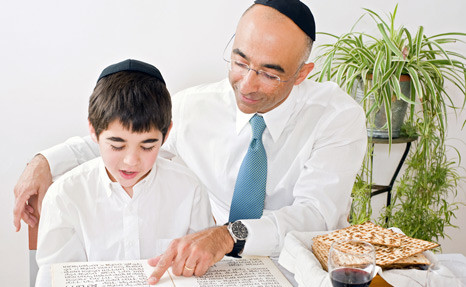by Rabbi Eddie Shostak, Hebrew Academy Elementary School Rav Mechanech, High School Israel Advisor
“Ve’Afilu Kulanu Chachamim” – “Even if all of us were wise, all of us understanding, all of us knowing the Torah, we would still be obligated to discuss the exodus from Egypt; and everyone who discusses the exodus from Egypt at length is praiseworthy.” (Pesach Haggadah)
How can we understand this unique mitzvah? Can we find another mitzvah that can be enhanced quantitatively? If we shake the lulav twice, did we perform 2 mitzvot? If we said keriat shema twice, did we perform 2 mitzvot? If we blew 200 shofar blasts, do we get credited for double the mitzvah? Of course not! Yet, with the mitzvah of “Ve’higadeta le’vincha” – telling the Passover story, the Haggadah is telling us that when it comes to this mitzvah, things are different.
The Rambam tells us concerning this mitzvah: “It is a mitzvah to inform one’s sons even though they do not ask, as it is stated [Shemot 13:8]: ‘You shall tell your son.’ A father should teach his son according to the son’s knowledge: How is this applied? If the son is young or foolish, he should tell him: ‘My son, in Egypt, we were all slaves like this maidservant or this slave. On this night, HaKadosh Baruch Hu redeemed us and took us out to freedom.’ If the son is older and wise, he should inform him about what happened to us in Egypt and the miracles wrought for us by Moses, our teacher; everything according to the son’s knowledge. (Hilchot Chametz U’Matza 7:2)
As we see, it is clear that the mitzvah of a parent telling the Pesach story to his child is more than disseminating information. Even if the parent has nothing new and novel to offer his child by way of knowledge or understanding the story, even if the child is more learned than his parent, the mitzvah of ve’higadeta le’vincha still applies.
Says the Slonimer Rebbe, zt”l, in his Netivot Shalom, the seder night is the Rosh Hashana for Emunah. The entire seder is designed in order to strengthen the chain of Emunah that was established at the time of Yetziat Mitzrayim. Through hearing the miracles of Pesach from his parent, the child is not just hearing information, he is hearing the same story that was told to his parents by his grandparents and teachers, which is the same story told to them by their great-grandparents –all the way back to Moshe Rabbeinu.
The seder is thus this pristine time designated for parents to connect to their children and for children to connect to their parents, no matter what age, no matter what level of knowledge or learning. So while each one of us is preparing for Pesach, whether it be cleaning, schlepping, cooking or learning, let us all keep the end in mind, let us always have the mission and purpose in mind –that of strengthening our relationship and bond with our children and parents, thus intensifying and building our Emunah in Hashem.
Chag Kasher Ve’Sameach.

